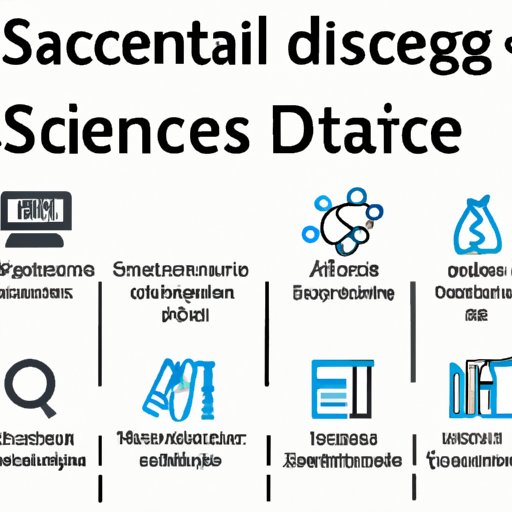Introduction
Data science is an interdisciplinary field that combines mathematics, computer science, and statistics to analyze large datasets. It is used to uncover patterns, trends, and insights from raw data, which can be used to make better decisions and improve business processes. With the rise of big data, the demand for data scientists has skyrocketed, making data science one of the most sought-after degrees today.
A degree in data science can open up a world of opportunities. It can lead to high-paying jobs in areas such as artificial intelligence, machine learning, and predictive analytics. Additionally, it can provide a solid foundation for further study in data science, such as a master’s or PhD. In this article, we will explore what a degree in data science entails and the benefits of obtaining one.
A Comprehensive Guide to Understanding a Data Science Degree
Data science degrees are offered at both the undergraduate and graduate levels. They are designed to provide students with the necessary skills and knowledge to work in the field of data science. Below, we will provide a comprehensive guide to understanding a data science degree.
Overview of What You Can Expect from a Data Science Degree Program
Data science degree programs typically involve courses in math, statistics, computer science, and database management. Depending on the program, students may also take courses in machine learning, natural language processing, and data visualization. In addition to coursework, students may be required to complete hands-on projects and internships.
Different Types of Data Science Degrees Available
There are several types of data science degrees available, including:
- Associate’s degree: An associate’s degree in data science typically takes two years to complete and provides students with the basics of data science, such as computing and programming fundamentals.
- Bachelor’s degree: A bachelor’s degree in data science usually takes four years to complete and provides students with a more comprehensive understanding of data science, such as data analysis, machine learning, and artificial intelligence.
- Master’s degree: A master’s degree in data science usually takes two years to complete and provides students with a deeper understanding of data science, such as advanced algorithms, data mining, and distributed computing.
- Doctoral degree: A doctoral degree in data science typically takes three to five years to complete and provides students with in-depth knowledge of data science topics, such as research methods, data governance, and predictive analytics.

Skills and Knowledge Gained Through a Data Science Degree
Earning a data science degree provides students with a variety of skills and knowledge. Below, we will discuss some of the skills and knowledge that can be gained through a data science degree.
Technical Skills
Data science degrees equip students with a variety of technical skills, such as coding, scripting, and database management. Students learn how to use programming languages such as Python, R, and SQL to manipulate and analyze data. They also gain experience using tools such as Hadoop, Spark, and Tableau to create visualizations and dashboards.
Analytical and Problem-Solving Skills
Data science degrees also provide students with analytical and problem-solving skills. Students learn how to identify patterns and trends in data, develop hypotheses, and test them. They also learn how to use mathematical and statistical models to solve complex problems.
Business Skills
Data science degrees also give students the opportunity to develop business skills, such as communication, project management, and decision-making. Students learn how to present their findings in a way that non-technical audiences can understand. They also gain experience working in teams to develop data-driven solutions to business challenges.
Communication Skills
Finally, data science degrees teach students how to effectively communicate with stakeholders. This includes the ability to explain complex concepts and data in a clear and concise manner. Students also learn how to collaborate with other professionals, such as data engineers and product managers, to ensure successful data-driven projects.
Conclusion
A degree in data science can provide students with a wealth of knowledge and skills. It can open up a world of opportunities, from high-paying jobs in areas such as artificial intelligence and machine learning to further study in data science. Through a data science degree, students can develop technical skills, analytical and problem-solving skills, business skills, and communication skills.
In summary, obtaining a data science degree can be extremely beneficial. It can provide students with the skills and knowledge they need to succeed in the world of data science. For those who are interested in pursuing a career in data science, earning a data science degree can be a great way to get started.
(Note: Is this article not meeting your expectations? Do you have knowledge or insights to share? Unlock new opportunities and expand your reach by joining our authors team. Click Registration to join us and share your expertise with our readers.)
